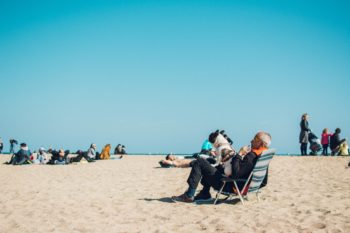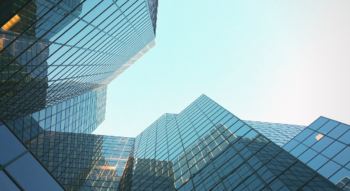Episode Notes
Episode Notes
With travel bans and canned plans, negotiating travel in the time of COVID is proving tricky. We’ll talk to experts about where the industry is at now, learn what’s happened to those dependant on the industry for their career, and explain why tourism is so stuck negotiating the present it’s almost impossible for those in it to plan for the future.
Dave (00:03):
I’ll show you the one we got, Ginge. Zip, the Manta Ray, a 16 foot Manta Ray.
Ginger Gorman (host) (00:08):
Looks nice.
Dave (00:09):
New Age caravan.
Ginger Gorman (host) (00:12):
Are those seats leather?
Belinda (00:13):
Yeah. With diamond stitching in white.
Ginger Gorman (host) (00:17):
I caught up with my friends Belinda and Dave recently, and they’ve done something I never thought they’d do. They bought this gorgeous caravan.
Dave (00:27):
It’s a self-sufficient caravan in the sense that it’s got solar panels, so you can do a couple of days off the grid, you don’t need to be in the caravan park. You can just pull up on the side of a road or down a dirt road.
Ginger Gorman (host) (00:39):
Yeah. So not just any caravan and definitely nothing like the old brown and orange van that my Nana owned in the ’80s.
Belinda (00:48):
Those vintage caravans are very cute, but yeah, no, I needed a bit more room inside. So we went this version instead.
Ginger Gorman (host) (00:57):
I heard a rumor that this one has a queen size bed.
Belinda (01:01):
Yeah. It does have a queen size bed and we upgraded the mattress to make it extra squishy and soft. Hopefully we’re going to spend 12 months in it so we had to get something that we were going to be comfortable in. It’s not just a weekender. It’s going to be our home for 12 months or so.
Ginger Gorman (host) (01:17):
I thought you guys were going overseas before the pandemic.
Belinda (01:21):
Well, it was my 50th birthday and David had organized a surprise. So I don’t know what he had planned, but I know we were planning to go overseas, but because of the pandemic, we’ve made alternate arrangements.
Dave (01:34):
Yeah. We love traveling overseas and that, but obviously the pandemic, we decided to stay at home and look at your own country, do the big lap. So yeah, there’s plenty in Australia to explore.
Ginger Gorman (host) (01:46):
Dave and Belinda have always loved an overseas holiday, but like so many jet-setting setting Australians the pandemic put paid to our obsession with world travel, and that’s been really tough, especially for people with family overseas. We’ve missed weddings, births, funerals. We’ve missed physical contact with parents, grandchildren, best friends and even partners. It’s also been tough on Australia’s tourism operators who relied so heavily on international visitors. In 2020, the industry lost $78.3 billion across domestic and international tourism. Many hope the hit would be short lived, but when I spoke to tourism researcher Professor Sara Dolnicar last year, she said it all hinged on the development of a COVID-19 vaccine.
Professor Sara Dolnicar (02:39):
If we do not find a vaccine, then the tourism industry is going to have to radically reinvent itself because suddenly safety is a serious concern, we can’t move freely, and movement obviously is the basis of our ability to go on holiday and go on vacation.
Ginger Gorman (host) (02:57):
That’s Sara. She’s from the Australian Institute for Business and Economics at the University of Queensland, and she’s also a fellow of the Academy of the Social Sciences in Australia. Since we spoke back in May, 2020, there have been a few developments so I decided to chat to her again a year later to find out how she thinks the Aussie tourism sector is faring.
Professor Sara Dolnicar (03:20):
Well, I can’t believe it’s been a year. It’s just really quite remarkable and my first observation would be when we chatted a year ago, there is no way, no way I would have thought we would chat again a year later and still not be back to normal. Not only are we not back to normal, it just seems to be getting worse and worse. So tourism obviously has been hit absolutely brutally. So if you look at the statistics, international travel worldwide dropped by 80, 90%. In Australia since April last year, 100%. Obviously, because we shut the borders, right? 100% since April.
Ginger Gorman (host) (04:03):
This is Seriously Social. I’m Ginger Gorman, let’s go for a trip across the state borders throughout regional Australia, and maybe even to New Zealand to find out how we’re all traveling since COVID-19.
Speaker 5 (04:39):
My wife and I had been planning to me to take long service leave in late March, early April of 2020 so that we’d be able to fly to California to celebrate her sister’s wedding in Palm Springs.
Speaker 6 (04:50):
I planned to go to East Timor and Indonesia last year to visit some friends who’ve been living and working over there.
Speaker 7 (04:56):
I had a cancellation last year for a trip to the UK to speak at a university.
Speaker 8 (05:02):
We had a truly epic two month family holiday planned for last year. We were to all meet in Lisbon for a very long overdue family reunion before exploring all of Portugal.
Ginger Gorman (host) (05:14):
So many of us have a story about long anticipated travel plans being canceled due to the pandemic. Even a year on from the first lockdown period in Australia, making plans to cross the state border, paying for a flight or booking accommodation, it feels risky, doesn’t it?
Professor Sara Dolnicar (05:34):
I think we just took tourism for granted. We just saw it as our entitlement to go on holiday and now we are just desperate to visit our grandparents. So my children haven’t seen either of their grandparents for 18 months. My mother’s in Europe, right? We have no idea when we’re going to see it. The other grandparents are in Adelaide. Well, we were supposed to go there last week, but they shut the border on us. So I think the appreciation that actually we value travel so much and we cannot take it for granted, and we rely on it so much for social connection. We also have the aspect of the employees. That’s, of course, the most disastrous aspect, because we have millions of people, but in Australia, literally about 700 thousands employed directly by tourism, another nearly 400 supplying through tourism.
Professor Sara Dolnicar (06:29):
Well, for them, the world has changed entirely because there is no more job security, from one day to another they don’t know is the restaurant or the hotel open or is it shut? Is the attraction going to survive or not? So devastating. There is no back to normal for employees in tourism and it doesn’t look like it’s going to be for a little while yet.
Ginger Gorman (host) (06:47):
Last year during the initial lockdown, Sara predicted that Australians would get back on the road and travel locally as soon as possible.
Professor Sara Dolnicar (06:57):
The short-term future will be domestic travel, right? As soon as we’re allowed to travel between states again or between New Zealand and Australia, there will be immediately demand. Why? Because we have been locked up for two months now. We are desperate for a vacation.
Ginger Gorman (host) (07:14):
So what has that meant for tourism operators in 2021? Has keeping Australians who love to travel confined to their own country been a boon for the industry, or is it just not possible for Australians alone to make up the shortfall once spent by international visitors?
Professor Sara Dolnicar (07:31):
2019, 45 billion was international visitor spend. That’s all gone by definition because these people can’t enter the country. Not only does it hurt the industry, it hurts the industry asymmetrically. So if you think about it, let’s say Queensland where I live, well in a time when the borders open and shut, what happens is we try to find ways to travel more locally. So because we don’t know when the next border shut down happens, we book our hotel relatively close by. Maybe we go on a road trip. So for those accommodation providers, the pain is not as bad, but there are certain sectors of the tourism industry that are just potentially wiped out by the loss of international travelers. So if you think, for example, shopping, zoos and aquariums, heritage sites, museums, art galleries, they get a much higher fraction of international tourists than domestic tourists, right? So while the local accommodation providers might be able to wiggle through, some of the attractions, some of the tour operators it’s potentially irrecoverable damage.
Ginger Gorman (host) (08:38):
The interesting thing about local travel is that in some sectors there have been winners, but then instead of seeing over-tourism overseas, we’re now seeing over-tourism in some sections in Australia, aren’t we?
Professor Sara Dolnicar (08:53):
Well, that’s also fascinating, isn’t it? Because I was studying Airbnb. I was very fascinated by Airbnb and what I learned through looking at Airbnb is just this over-tourism phenomenon in the big capital cities in the world, right? New York, Paris, San Francisco. Because that coincided with real negative impacts of Airbnb in these places where real estate markets changed completely. Right? So it was really a very tangible indicator of that over-tourism. Well, suddenly that’s not a problem anymore. People do not want to go to cities. People do not want to go anywhere where there’s a lot of other people. So they go to regional areas.
Professor Sara Dolnicar (09:33):
Now, I would disagree slightly with you, Ginger, on that because a lot of those areas are desperate for tourism business. So before COVID, Airbnb saved them because Airbnb brought a few tourists in, they had lunch, they had dinner, they went to an event, to a festival and it brought in dollars. So that’s maybe one of the positives that we can maybe reduce that over-tourism in the large centers and push more tourism in the regions that need it.
Ginger Gorman (host) (10:04):
But I’m wondering about whether those small centers actually have the infrastructure to cope with it. I was having an interesting discussion at a barbecue actually and people were saying that places like Byron Bay and the Blue Mountains are heaving, there’s traffic jams, there’s too many people walking on the streets on weekends. Obviously, yes, that is bringing in dollars, but in another way, those tourists are not having a very pleasant time.
Professor Sara Dolnicar (10:29):
Yeah, that’s a good point. I would put maybe the two locations you’ve stated in the middle here. It’s not quite New York, but it’s not quite Broken Hill or Kobar, right?
Ginger Gorman (host) (10:38):
No.
Professor Sara Dolnicar (10:39):
So I think there is still so much of Australia that we could explore that is not even remotely a tourism destination yet and these places could hugely benefit by having some welcoming more visitors.
Ginger Gorman (host) (10:59):
I read somewhere that since the pandemic caravan sales in Australia have increased by 242%. Remember my friends Dave and Belinda with the super plush caravan? They actually had to wait almost a year for it.
Dave (11:15):
When we went to get it, Ginger, we actually didn’t go to buy it. We went to a kick a few tires and have a look at a few vans. But we talked to the dealerships at the time, we weren’t planning on purchasing anything, but they said the lead in time for delivery was 12 to 15 months. So this dealership gave us a bit of a deal and said, “We can get you one in about eight months,” so we put a deposit down and here we are today.
Ginger Gorman (host) (11:36):
Are you worried about sudden snap border closures? Because that even happened to me last holidays, that suddenly things would change.
Dave (11:44):
Yeah. That is a big factor. It’s the unknown now. So you hit the road and you can go as far as you can and if we have to stop or isolate or we can’t go any further, so be it. Yeah. We’ve got the van. We can pull up and stay there until things cool down and keep going.
Ginger Gorman (host) (12:03):
Might throw a swag in the back of my car and come find you.
Dave (12:07):
Always welcome.
Professor Sara Dolnicar (12:09):
We’re cocooning, aren’t we? That’s funny. Cocooning used to be a term for at home and now we’re just got to creating our little cocoon and we travel in the cocoon in the safety of our car or our caravan. Again, I don’t blame people. It is very understandable. If you think about transport itself, hopping on a plane, you have other people around you, they sneeze, they touch things. You are in your car, you know it’s clean, nobody’s coming there. You can see the psychology of it, right? It just gives us that confidence that it’s one fewer thing we need to worry about if we are within our safe space.
Ginger Gorman (host) (12:47):
One part of the industry that has really benefited from this shift in so-called cocooning are holiday parks. Belinda Thomas is the general manager of business development for Big4 Holiday Parks, Australia.
Belinda Thomas (13:04):
In comparison, if we remove the COVID period and we compare financial years ’20 to ’19, the first half on the same path basis, we did after that 41 million in total sales through big4.com.au in the last six months and we’re projecting 80 million for the year. So that’s a massive increase for us compared to where we were the same time last year. So even just preempting bookings coming back, but it’s the level of inquiries that we’ve seen we just probably didn’t foresee. We’ve had over 5 million web visitors in the last six months and we expect that to exceed 10 million for the year, and over 50% of our sales are coming from people that aren’t actually members of our membership program. So possibly people that are new to the holiday park industry, but certainly new to our brand, which is really awesome.
Belinda Thomas (14:04):
So our total online revenue grew by 94%. We’ve got cabin revenue that’s up 101%. Our site revenues grown by 76% and our top total nights grew by 74%. So definitely it’s had a positive impact on us and I think international borders closing and cruising not being as predominant as it was previously has definitely helped that. But it’s this urge to want to get back to nature and to have these different and unique experiences as well that is driving that.
Ginger Gorman (host) (14:42):
I’m wondering if you can tell me a little bit more about who these new customers are and why you think that they are suddenly wanting to caravan as opposed to, say, stay in a hotel or other options that we still do have available to us.
Belinda Thomas (14:58):
Well, we’ve seen a 10% increase in our member base in the last six months and a lot of them, as I said, are new customers that have been attracted to the caravan and camping industry. We engage a company called BDA who provides some insights across our business and the industry and that definitely shows that the intention to stay in a holiday park by both considerers and non-considerers is certainly there and it’s flowing onto the next two years, which is really awesome and great news. This is kind of reinforced by there is a backlog for caravan manufacturing that goes well into the next 18 months. So there’s definitely a lot of people that are out there going, “You know what? We’re not going on that overseas trip anymore. Let’s go and buy caravan and we’ll go and see some of Australia,” which is awesome.
Belinda Thomas (15:46):
You can also look at the success of Camplify. I’m not sure if you’ve heard of that, but it provides a website for van owners around the world to offer their vans to other people. So it’s kind of like the Airbnb of our industry. There’s also this growing social trend among young couples who were buying old caravans and doing them up and wanting to take off and travel Australia. In fact, I did a little search earlier. The hashtag van life has now reached over 9.8 million posts on Instagram. I mean, that’s phenomenal for an industry that predominantly was really … we were well known for our gray nomads that really liked to get in caravans and travel.
Belinda Thomas (16:28):
I definitely think that it’s this thirst for new and unique places to explore and holiday parks are really well-placed in really lovely, unique locations. I think we cater well for all budgets, as well as offering accommodation that has a little bit of a point of difference. Not long ago, TripAdvisor curated a list of 10 destinations worldwide that people were dreaming of and places included the Caribbean, Florida and Brazil and sneaking in at number 10 was Mudgee, New South Wales. I mean, that’s really something that we haven’t ever seen before.
Ginger Gorman (host) (17:08):
I suppose another positive to come from the drop in international travel has been the reduction in carbon emissions. According to the David Suzuki Foundation, if the aviation sector we’re a nation, it will be among the top 10 global emitters. Just think about that for a second.
Ginger Gorman (host) (17:30):
Sara has been watching this change closely and she can see an opportunity for reforms that would benefit the planet for the long term.
Professor Sara Dolnicar (17:38):
I don’t have annual stats, but when I first looked at when the stats on carbon emissions came out last year, global carbon emissions because of COVID dropped by early April 20 by 17%. Can you imagine? No commitments we make ever achieve that kind of drop in carbon emissions. From aviation alone, 60%. Right? So if you are able to step back, you have to say, “Come on guys, this is a real opportunity.” So how can we do things better when this industry restarts again? Because when it will restart, my prediction is it’ll explode. The moment we are set free, we are so desperate to go on holidays, it will explode. It will not slowly start growing. So we really could have put things in place, be it technical improvement with aviation fuels or be it little changes of how we operate hotels where we don’t clean the room every day, where we don’t have, I don’t know, unlimited beef buffets with massive plates where people throw away … Just little things that would also help businesses save money, in fact.
Ginger Gorman (host) (18:50):
How dependent on the vaccine rollout and a successful rollout is the future of tourism, do you think?
Professor Sara Dolnicar (18:58):
Absolutely. It’s absolutely essential and I must say I have been immensely impressed with the people I’m calling at Qantas because I book, I cancel, I book, I cancel. If you think of a company like Qantas, the delay in the vaccine rollout, well, that is just an unbelievable shock. Slowly the hope was October, we might fly internationally again. Well, now that’s gone. It might be a year later for all we know. So absolutely. International travel is 100% dependent on vaccination and my personal concern is that if people … Now that there’s doubt about safety, right? If people are unwilling to get vaccinated, well then, when will the borders open? It’s just not a trivial question right now. It’s just not obvious.
Ginger Gorman (host) (19:47):
It’s really interesting listening to you because it’s almost like the whole industry has to be stuck in the right now. They can’t plan for the future because the uncertainty is too immense.
Professor Sara Dolnicar (20:00):
Yeah. You just have to always run on five parallel scenarios, which could all happen within a day. The snap lock downs happen within a day. So a state lockdown or a greater region lockdown, suddenly the hotel just gets one phone call after the other. Qantas gets one phone call after the other. Cancellations, cancellations. But then all the locals call and they say, “I had to cancel my interstate trip. Can I come to your hotel?” So it’s constant uncertainty and basically weighing one scenario against the other of how to try to survive and negotiate this on an everyday basis.
Ginger Gorman (host) (20:34):
We’ve talked a lot about the difficult and dark aspects of the current situation for the tourism industry. But have there been any winners out of this, do you think?
Professor Sara Dolnicar (20:45):
I think there would have been winners, yes. I think they are rare. They are few. But thinking about, for example, the Brisbane area. Within, let’s say, two hours out of Brisbane, I imagine that those hotels would have done quite well because people want to leave. They want to go away for the weekend. They want to go away for the school holidays, but they don’t want to take the risk of getting locked in quarantine or having your situation of driving through a state and not being able to go to the toilet along the way. Right? So I do think that there would have been pockets of tourism providers in those areas close by of large metropolitan areas that would have benefited. They may even have had better outcomes than a year earlier as a consequence, but those are the exceptions. Certainly they are not the norm.
Ginger Gorman (host) (21:41):
This is Seriously Social, I’m Ginger Gorman and I’m taking my own break for a few weeks. Maybe I’ll hitch a ride with David and Belinda, or maybe the kids and I can do some cocooning in one of our favourite hamlets on the New South Wales South Coast. We’ll be back in July with season four, starting with a two-part special on memory, memories gained and memories lost. In the meantime, we’d love you to share this episode with your friends or colleagues or connect with us on our social channels. You can find it all at seriouslysocial.org.au. See you soon.
Useful Links



